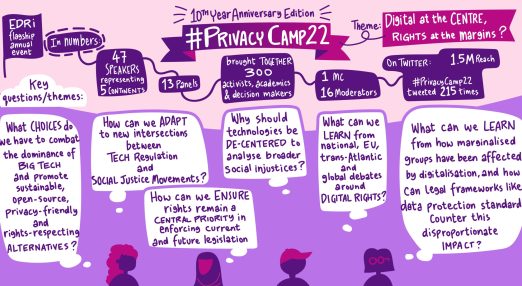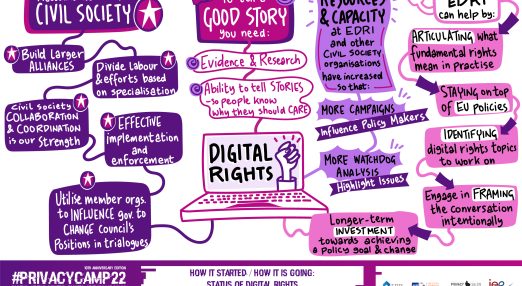Our work
EDRi is the biggest European network defending rights and freedoms online. We work to to challenge private and state actors who abuse their power to control or manipulate the public. We do so by advocating for robust and enforced laws, informing and mobilising people, promoting a healthy and accountable technology market, and building a movement of organisations and individuals committed to digital rights and freedoms in a connected world.
Filter resources
-

#PrivacyCamp22: Event Summary
The theme of the 10th-anniversary edition of Privacy Camp was "Digital at the centre, rights at the margins" and included thirteen sessions on a variety of topics. The event was attended by 300 people. If you missed the event or want a reminder of what happened in a session, find the session summaries and video recordings below.
Read more
-

Declaration of Digital Principles: Towards a digital pillar of the EU?
On 26 January the European Commission proposed a Declaration on European Digital Rights and Principles. The Declaration will take the form of a joint solemn declaration to be signed by the European Parliament, the Council, and the Commission.
Read more
-

Technologies for border surveillance and control in Italy
This research points out that identification and categorisation systems for migrants, refugees, and asylum-seekers, rely on vast quantities of biometric data including fingerprints and facial images. It is, however, often difficult to assess how these procedures are managed. Upon identification, the aforementioned groups have limited knowledge and awareness about where and how their personal and biometric data are going to be stored and used, hindering them from countering the pressure that this flow of information puts on their subsequent living conditions in Italy and in the European Union.
Read more
-

Belgian authority finds IAB Europe’s consent pop-ups incompatible with the GDPR
Following a number of complaints filed in 2018 and 2019, including by EDRi-members Panoptykon and Bits of Freedom, and coordinated by the Irish Council for Civil Liberties, the Belgian Data Protection Authority has found that the consent system developed and managed by the adtech industry body IAB Europe, and used by many websites in the EU, is illegal under the GDPR.
Read more
-

How it started, how it’s going: Halfway through the current European Commission’s legislative term
In January 2022, EDRi held a panel at its annual flagship event Privacy Camp to discuss the EU’s current legislative term and what to expect by the next EU elections in terms of digital rights.
Read more
-

Chat control: 10 principles to defend children in the digital age
The automated scanning of everyone’s private communications, all of the time, constitutes a disproportionate interference with the very essence of the fundamental right to privacy. It can constitute a form of undemocratic mass surveillance, and can have severe and unjustified repercussions on many other fundamental rights and freedoms, too.
Read more
-

The EU Parliament takes strong stance against surveillance ads
The Platform Power campaign, alongside many civil society organisations, raised its voice for stronger laws against the business model of Big Tech online platforms and succesfully pressured law-makers to put people at the center of the debate.
Read more
-

EDRi-gram, 2 February 2022
In this edition of the EDRi-gram, we dive into the secret negotiations about Europol's reform that would enable mass surveillance of people and discriminatory predictive policing. We also take a peek at the European Parliament's approval of a rights-respecting Digital Services Act and its proposal to ban the use of sensitive personal data for online ads.
Read more
-

Framing the future of the internet
The European Parliament has just voted on the Digital Services Act, crucial for internet regulation.
Read more
-

Digital Dissidents will introduce those who do not use technology
Czech digital legal organisation and an EDRi member Iuridicum Remedium (IuRe) organised the Big Brother Film Festival in Prague a few months ago, at the end of 2021. Thanks to a collaboration with the Kinolab group and director Barbora Johansson, a movie was created in connection to the festival, which deals with the topics of the digital gap and digital exclusion.
Read more
-

Join our bootcamp and Reclaim Your Face
Reclaim Your Face is expanding to different cities in Europe. To support this growth we are launching a bootcamp to train volunteers and expand the fight against biometric mass surveillance.
Read more
-

Online Safety Bill: Kill Switch for Encryption
Of the many worrying provisions contained within the draft Online Safety Bill, perhaps the most consequential is contained within Chapter 4, at clauses 63-69. This section of the Bill hands OFCOM the power to issue “Use of Technology Notices” to search engines and social media companies.
Read more
